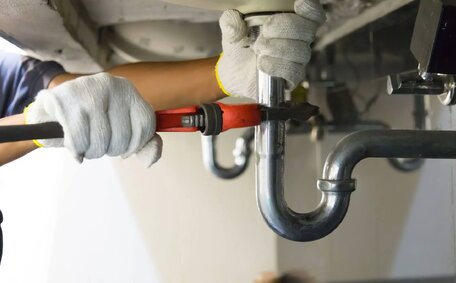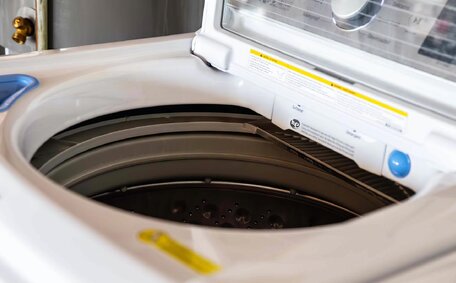What causes blocked drains in rental properties?
There are several common causes of blocked drains in rental properties:
- Buildup of grease, oil, hair, and food scraps going down kitchen sinks and drains
- Tenants flushing inappropriate items like wipes, paper towels, and feminine hygiene products down toilets
- Tree roots or plant debris entering drainage pipes around your property
- Old pipes that have built up mineral deposits or have collapsed over time
Blocked drains within rental properties often stem from tenant-related actions or uncontrollable external stormwater drainage issues.
Regular maintenance, like sealing openings and avoiding the disposal of fats or solids into drains, is pivotal. It is essential for property stakeholders to clarify maintenance responsibilities to facilitate proper inspections and cleanings of drains and sewers.
Defining responsibility: Landlords vs tenants
A clear division of responsibilities exists between landlords and tenants in maintaining and repairing rental properties:
Landlords are generally responsible Upholding the property’s structural integrity:
- Upholding the property’s structural integrity
- Guaranteeing the proper functioning of supplied appliances, fixtures, and the drainage system
- Addressing urgent repairs including plumbing leaks and electrical faults
Tenants are expected to:
- Exercise reasonable care in maintaining all aspects of the property
- Report maintenance issues promptly to prevent further damage
- Refrain from intentionally damaging any part of the rental
If tracing reveals that issues within the building’s water system or public drainage infrastructure have caused a blocked drain, the landlord is usually responsible. Tenant liability may arise from careless actions such as pouring grease down a kitchen sink or flushing unsuitable items.
Landlords are usually tasked with arranging professional plumbing services to inspect and resolve blockages, irrespective of who is at fault. Tenants must promptly report any significant drainage issues to their property manager.
Determining liability in various scenarios
Determining who is liable for a blocked drain in a rental property depends on the location and cause of the blockage. Here are some common scenarios:
Blockage inside the rental property
Blocked sewers or drain pipes within the rental property are usually the landlord’s responsibility to clear and repair. Exceptions occur when the tenant clearly causes the blockage by disposing of fats/oils in drains or flushing unsuitable items.
Blockage in shared/public drainage pipes
Liability for blockages in shared waste pipes or public sewer mains outside the property can differ. In apartments/units, the body corporate or strata agency usually covers common sewer lines. In houses, if the public sewer main is blocked, the Sydney Water or local water authority arranges repairs.
Urgent blocked drain situations
In emergencies where sewage backs up within a rental property from a blockage, the landlord or property manager must urgently dispatch a licenced plumber to expertly address the situation.
Immediate action is critical for health, sanitation, prevention of property damage, and legal compliance. Responsibility for blockages is determined after the urgent issue is resolved.
CCTV drain inspections accurately determine liability by identifying the exact location and cause of blockages. Where the blockage originated from indicates who is responsible for the costs of fixing blocked drains and other repairs.
Navigating repairs and legal options
If a blocked drain occurs in a rental property, there are steps tenants can take to get the issue resolved while also understanding their legal rights and options:
Review the tenancy agreement
The tenancy agreement typically delineates maintenance and repair responsibilities. This document specifies who is liable for resolving drain blockages and related plumbing concerns. Seek clarification from your property manager if in doubt.
Contact your landlord or agent
Immediately submit a detailed maintenance request to your landlord or property manager upon discovering a blocked drain. Take dated photos showing drain issues, which are signs blocked drains typically manifest, such as water overflow or drainage problems, as evidence.
Follow up on repair timeframes
Under the right to 'quiet enjoyment’ of the property, most state laws mandate landlords to perform urgent repairs within 24-48 hours. This covers burst pipes, blocked drains, gas leaks, electrical faults etc.
Contact tradespersons directly
Should the landlord delay repairs for a blocked drain, you may contact our licenced plumbers and later seek reimbursement for their services. Keep invoices to submit to the landlord. If reimbursement is denied, consider consulting further plumbing services or reaching out to Fair Trading for advice as a renter.
Seek compensation for negligence
If a landlord’s failure to fix a blocked drain promptly leads to property damage or health issues, tenants may be able take legal action through Fair Trading or NCAT to claim compensation, including for repair costs, loss of rent, medical bills and damaged possessions.
Understand tenant maintenance obligations
Although landlords manage structural repairs, tenants are responsible for avoiding actions that may lead to drain blockages, such as disposing of fats/oils or inappropriate items down the drain. Tenants may need to pay repair costs if they directly caused any blockages or damage in your drains.





